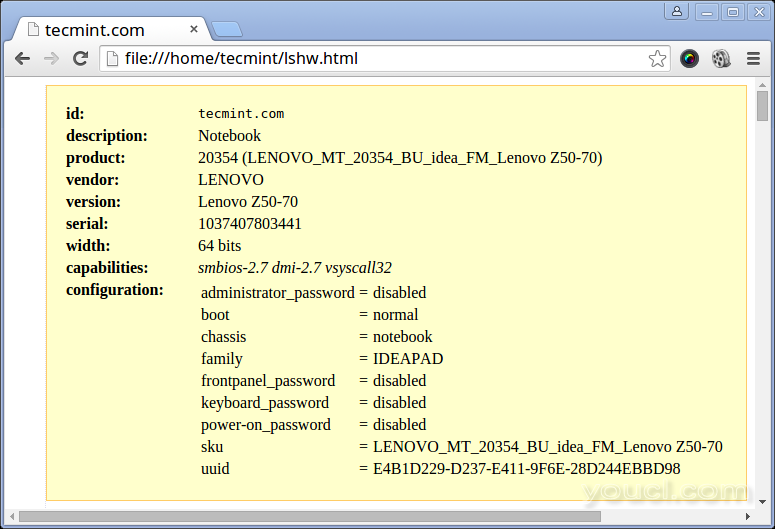
10在Linux中检查硬件和系统信息的命令
1.如何查看Linux系统信息
要知道,只有系统名称,可以使用 uname命令没有任何开关将打印系统信息或 UNAME -s命令将打印系统的内核名称。youcl@youcl ~ $ uname Linux要查看网络的主机名,请使用uname命令 “-n”开关,如图所示。
youcl@youcl ~ $ uname -n youcl.com要获取有关内核版本,使用 '-v'开关信息。
youcl@youcl ~ $ uname -v #64-Ubuntu SMP Mon Sep 22 21:28:38 UTC 2014为了让你的内核版本的信息,请使用 “-r”开关。
youcl@youcl ~ $ uname -r 3.13.0-37-generic要打印您的机器硬件的名称,使用 “-m”开关:
youcl@youcl ~ $ uname -m x86_64所有这些信息可以通过一次如下所示运行 “的uname -a”命令进行打印。
youcl@youcl ~ $ uname -a Linux youcl.com 3.13.0-37-generic #64-Ubuntu SMP Mon Sep 22 21:28:38 UTC 2014 x86_64 x86_64 x86_64 GNU/Linux
2.如何查看Linux系统硬件信息
在这里,您可以使用 lshw工具来收集有关您的硬件部件,如 CPU, 磁盘 , 内存 ,USB控制器等大量信息 lshw是一个相对较小的工具,也有一些可以在提取信息,它使用几个选项。 通过 lshw提供的信息聚集形成不同 的/ proc文件。 注 :请注意,以超级用户 (root)或 sudo用户执行的 lshw命令。 另请阅读 : 在Linux中苏sudo的用户之间的区别 要打印有关Linux系统硬件的信息,请运行此命令。youcl@youcl ~ $ sudo lshw youcl.com description: Notebook product: 20354 (LENOVO_MT_20354_BU_idea_FM_Lenovo Z50-70) vendor: LENOVO version: Lenovo Z50-70 serial: 1037407803441 width: 64 bits capabilities: smbios-2.7 dmi-2.7 vsyscall32 configuration: administrator_password=disabled boot=normal chassis=notebook family=IDEAPAD frontpanel_password=disabled keyboard_password=disabled power-on_password=disabled sku=LENOVO_MT_20354_BU_idea_FM_Lenovo Z50-70 uuid=E4B1D229-D237-E411-9F6E-28D244EBBD98 *-core description: Motherboard product: Lancer 5A5 vendor: LENOVO physical id: 0 version: 31900059WIN serial: YB06377069 slot: Type2 - Board Chassis Location *-firmware description: BIOS vendor: LENOVO physical id: 0 version: 9BCN26WW date: 07/31/2014 size: 128KiB capacity: 4032KiB capabilities: pci upgrade shadowing cdboot bootselect edd int13floppynec int13floppytoshiba int13floppy360 int13floppy1200 int13floppy720 int13floppy2880 int9keyboard int10video acpi usb biosbootspecification uefi ......您可以通过使用 -short选择打印您的硬件信息的汇总。
youcl@youcl ~ $ sudo lshw -short H/W path Device Class Description ===================================================== system 20354 (LENOVO_MT_20354_BU_idea_FM_Lenovo Z50-70) /0 bus Lancer 5A5 /0/0 memory 128KiB BIOS /0/4 processor Intel(R) Core(TM) i5-4210U CPU @ 1.70GHz /0/4/b memory 32KiB L1 cache /0/4/c memory 256KiB L2 cache /0/4/d memory 3MiB L3 cache /0/a memory 32KiB L1 cache /0/12 memory 8GiB System Memory /0/12/0 memory DIMM [empty] /0/12/1 memory DIMM [empty] /0/12/2 memory 8GiB SODIMM DDR3 Synchronous 1600 MHz (0.6 ns) /0/12/3 memory DIMM [empty] /0/100 bridge Haswell-ULT DRAM Controller /0/100/2 display Haswell-ULT Integrated Graphics Controller /0/100/3 multimedia Haswell-ULT HD Audio Controller ...如果你想生成一个HTML文件输出,可以使用该选项 -html。
youcl@youcl ~ $ sudo lshw -html > lshw.html

以HTML形式生成Linux硬件信息
3.如何查看Linux CPU信息
要查看你的CPU信息,请使用lscpu命令,因为它显示你的CPU体系结构的信息,如从 sysfs中和 的/ proc内/ cpuinfo CPU的数量,内核,CPU系列型号,CPU高速缓存,线程等。youcl@youcl ~ $ lscpu Architecture: x86_64 CPU op-mode(s): 32-bit, 64-bit Byte Order: Little Endian CPU(s): 4 On-line CPU(s) list: 0-3 Thread(s) per core: 2 Core(s) per socket: 2 Socket(s): 1 NUMA node(s): 1 Vendor ID: GenuineIntel CPU family: 6 Model: 69 Stepping: 1 CPU MHz: 768.000 BogoMIPS: 4788.72 Virtualization: VT-x L1d cache: 32K L1i cache: 32K L2 cache: 256K L3 cache: 3072K NUMA node0 CPU(s): 0-3
4.如何收集Linux块设备信息
块设备是存储设备,诸如硬盘,闪存驱动器等 lsblk命令用于报告关于块设备的信息如下。youcl@youcl ~ $ lsblk NAME MAJ:MIN RM SIZE RO TYPE MOUNTPOINT sda 8:0 0 931.5G 0 disk ├─sda1 8:1 0 1000M 0 part ├─sda2 8:2 0 260M 0 part /boot/efi ├─sda3 8:3 0 1000M 0 part ├─sda4 8:4 0 128M 0 part ├─sda5 8:5 0 557.1G 0 part ├─sda6 8:6 0 25G 0 part ├─sda7 8:7 0 14.7G 0 part ├─sda8 8:8 0 1M 0 part ├─sda9 8:9 0 324.5G 0 part / └─sda10 8:10 0 7.9G 0 part [SWAP] sr0 11:0 1 1024M 0 rom如果你想查看系统上所有的块设备则包括 -a选项。
youcl@youcl ~ $ lsblk -a NAME MAJ:MIN RM SIZE RO TYPE MOUNTPOINT sda 8:0 0 931.5G 0 disk ├─sda1 8:1 0 1000M 0 part ├─sda2 8:2 0 260M 0 part /boot/efi ├─sda3 8:3 0 1000M 0 part ├─sda4 8:4 0 128M 0 part ├─sda5 8:5 0 557.1G 0 part ├─sda6 8:6 0 25G 0 part ├─sda7 8:7 0 14.7G 0 part ├─sda8 8:8 0 1M 0 part ├─sda9 8:9 0 324.5G 0 part / └─sda10 8:10 0 7.9G 0 part [SWAP] sdb 8:16 1 0 disk sr0 11:0 1 1024M 0 rom ram0 1:0 0 64M 0 disk ram1 1:1 0 64M 0 disk ram2 1:2 0 64M 0 disk ram3 1:3 0 64M 0 disk ram4 1:4 0 64M 0 disk ram5 1:5 0 64M 0 disk ram6 1:6 0 64M 0 disk ram7 1:7 0 64M 0 disk ram8 1:8 0 64M 0 disk ram9 1:9 0 64M 0 disk loop0 7:0 0 0 loop loop1 7:1 0 0 loop loop2 7:2 0 0 loop loop3 7:3 0 0 loop loop4 7:4 0 0 loop loop5 7:5 0 0 loop loop6 7:6 0 0 loop loop7 7:7 0 0 loop ram10 1:10 0 64M 0 disk ram11 1:11 0 64M 0 disk ram12 1:12 0 64M 0 disk ram13 1:13 0 64M 0 disk ram14 1:14 0 64M 0 disk ram15 1:15 0 64M 0 disk
5.如何打印USB控制器信息
所述 的lsusb命令用于报告关于USB控制器和所有连接到他们的设备的信息。youcl@youcl ~ $ lsusb Bus 001 Device 002: ID 8087:8000 Intel Corp. Bus 001 Device 001: ID 1d6b:0002 Linux Foundation 2.0 root hub Bus 003 Device 001: ID 1d6b:0003 Linux Foundation 3.0 root hub Bus 002 Device 005: ID 0bda:b728 Realtek Semiconductor Corp. Bus 002 Device 004: ID 5986:0249 Acer, Inc Bus 002 Device 003: ID 0bda:0129 Realtek Semiconductor Corp. RTS5129 Card Reader Controller Bus 002 Device 002: ID 045e:00cb Microsoft Corp. Basic Optical Mouse v2.0 Bus 002 Device 001: ID 1d6b:0002 Linux Foundation 2.0 root hub您可以使用 -v选项生成每个USB设备的详细信息。
youcl@youcl ~ $ lsusb -v
6.如何打印PCI设备信息
PCI设备可以包括USB接口,显卡,网卡等 lspci的工具,用于生成有关系统上的所有PCI控制器以及连接到这些设备的信息。 要打印有关PCI设备的信息,请运行以下命令。youcl@youcl ~ $ lspci 00:00.0 Host bridge: Intel Corporation Haswell-ULT DRAM Controller (rev 0b) 00:02.0 VGA compatible controller: Intel Corporation Haswell-ULT Integrated Graphics Controller (rev 0b) 00:03.0 Audio device: Intel Corporation Haswell-ULT HD Audio Controller (rev 0b) 00:14.0 USB controller: Intel Corporation Lynx Point-LP USB xHCI HC (rev 04) 00:16.0 Communication controller: Intel Corporation Lynx Point-LP HECI #0 (rev 04) 00:1b.0 Audio device: Intel Corporation Lynx Point-LP HD Audio Controller (rev 04) 00:1c.0 PCI bridge: Intel Corporation Lynx Point-LP PCI Express Root Port 3 (rev e4) 00:1c.3 PCI bridge: Intel Corporation Lynx Point-LP PCI Express Root Port 4 (rev e4) 00:1c.4 PCI bridge: Intel Corporation Lynx Point-LP PCI Express Root Port 5 (rev e4) 00:1d.0 USB controller: Intel Corporation Lynx Point-LP USB EHCI #1 (rev 04) 00:1f.0 ISA bridge: Intel Corporation Lynx Point-LP LPC Controller (rev 04) 00:1f.2 SATA controller: Intel Corporation Lynx Point-LP SATA Controller 1 [AHCI mode] (rev 04) 00:1f.3 SMBus: Intel Corporation Lynx Point-LP SMBus Controller (rev 04) 01:00.0 Ethernet controller: Realtek Semiconductor Co., Ltd. RTL8111/8168/8411 PCI Express Gigabit Ethernet Controller (rev 10) 02:00.0 Network controller: Realtek Semiconductor Co., Ltd. RTL8723BE PCIe Wireless Network Adapter 03:00.0 3D controller: NVIDIA Corporation GM108M [GeForce 840M] (rev a2)使用 -t选项以树的形式产生输出。
youcl@youcl ~ $ lspci -t -[0000:00]-+-00.0 +-02.0 +-03.0 +-14.0 +-16.0 +-1b.0 +-1c.0-[01]----00.0 +-1c.3-[02]----00.0 +-1c.4-[03]----00.0 +-1d.0 +-1f.0 +-1f.2 \-1f.3使用 -v选项,产生每个连接的设备的详细信息。
youcl@youcl ~ $ lspci -v 00:00.0 Host bridge: Intel Corporation Haswell-ULT DRAM Controller (rev 0b) Subsystem: Lenovo Device 3978 Flags: bus master, fast devsel, latency 0 Capabilities: 00:02.0 VGA compatible controller: Intel Corporation Haswell-ULT Integrated Graphics Controller (rev 0b) (prog-if 00 [VGA controller]) Subsystem: Lenovo Device 380d Flags: bus master, fast devsel, latency 0, IRQ 62 Memory at c3000000 (64-bit, non-prefetchable) [size=4M] Memory at d0000000 (64-bit, prefetchable) [size=256M] I/O ports at 6000 [size=64] Expansion ROM at [disabled] Capabilities: Kernel driver in use: i915 .....
7.如何打印SCSI设备信息
要查看所有的SCSI / SATA设备,使用如下命令 使用lsscsi。 如果您没有安装 使用lsscsi工具,运行以下命令来安装它。$ sudo apt-get install lsscsi [on Debian derivatives] # yum install lsscsi [On RedHat based systems] # dnf install lsscsi [On Fedora 21+ Onwards]安装后,运行 使用lsscsi命令,如下所示:
youcl@youcl ~ $ lsscsi [0:0:0:0] disk ATA ST1000LM024 HN-M 2BA3 /dev/sda [1:0:0:0] cd/dvd PLDS DVD-RW DA8A5SH RL61 /dev/sr0 [4:0:0:0] disk Generic- xD/SD/M.S. 1.00 /dev/sdb使用 -s选项,以显示设备尺寸。
youcl@youcl ~ $ lsscsi -s [0:0:0:0] disk ATA ST1000LM024 HN-M 2BA3 /dev/sda 1.00TB [1:0:0:0] cd/dvd PLDS DVD-RW DA8A5SH RL61 /dev/sr0 - [4:0:0:0] disk Generic- xD/SD/M.S. 1.00 /dev/sdb -
8.如何打印有关SATA设备的信息
您可以找到有关SATA设备在系统上的一些信息使用 hdparm的工具如下。 在下面的例子中,我用我的系统上的块设备 / dev / sda1的该硬盘。youcl@youcl ~ $ sudo hdparm /dev/sda1 /dev/sda1: multcount = 0 (off) IO_support = 1 (32-bit) readonly = 0 (off) readahead = 256 (on) geometry = 56065/255/63, sectors = 2048000, start = 2048要打印有关设备的几何interms的柱面,磁头,扇区,大小和起始的设备偏移信息,使用 -g选项。
youcl@youcl ~ $ sudo hdparm -g /dev/sda1 /dev/sda1: geometry = 56065/255/63, sectors = 2048000, start = 2048
9.如何打印Linux文件系统信息
要收集有关文件系统的分区的信息,您可以使用 fdisk命令。 虽然 fdisk命令的主要功能是修改文件系统的分区,它也可以用来查看有关文件系统上的不同分区的信息。 您可以如下打印分区信息。记住以超级用户身份运行命令,否则可能看不到任何输出。youcl@youcl ~ $ sudo fdisk -l WARNING: GPT (GUID Partition Table) detected on '/dev/sda'! The util fdisk doesn't support GPT. Use GNU Parted. Disk /dev/sda: 1000.2 GB, 1000204886016 bytes 255 heads, 63 sectors/track, 121601 cylinders, total 1953525168 sectors Units = sectors of 1 * 512 = 512 bytes Sector size (logical/physical): 512 bytes / 4096 bytes I/O size (minimum/optimal): 4096 bytes / 4096 bytes Disk identifier: 0xcee8ad92 Device Boot Start End Blocks Id System /dev/sda1 1 1953525167 976762583+ ee GPT Partition 1 does not start on physical sector boundary.
10.如何提取有关硬件组件的信息
您还可以使用 的dmidecode实用工具通过读取DMI表中的数据提取硬件信息。 要打印有关内存的信息,请以超级用户身份运行此命令。youcl@youcl ~ $ sudo dmidecode -t memory # dmidecode 2.12 # SMBIOS entry point at 0xaaebef98 SMBIOS 2.7 present. Handle 0x0005, DMI type 5, 24 bytes Memory Controller Information Error Detecting Method: None Error Correcting Capabilities: None Supported Interleave: One-way Interleave Current Interleave: One-way Interleave Maximum Memory Module Size: 8192 MB Maximum Total Memory Size: 32768 MB Supported Speeds: Other Supported Memory Types: Other Memory Module Voltage: Unknown Associated Memory Slots: 4 0x0006 0x0007 0x0008 0x0009 Enabled Error Correcting Capabilities: None ...要打印有关系统的信息,请运行此命令。
youcl@youcl ~ $ sudo dmidecode -t system # dmidecode 2.12 # SMBIOS entry point at 0xaaebef98 SMBIOS 2.7 present. Handle 0x0001, DMI type 1, 27 bytes System Information Manufacturer: LENOVO Product Name: 20354 Version: Lenovo Z50-70 Serial Number: 1037407803441 UUID: 29D2B1E4-37D2-11E4-9F6E-28D244EBBD98 Wake-up Type: Power Switch SKU Number: LENOVO_MT_20354_BU_idea_FM_Lenovo Z50-70 Family: IDEAPAD ...要打印有关BIOS的信息,请运行此命令。
youcl@youcl ~ $ sudo dmidecode -t bios # dmidecode 2.12 # SMBIOS entry point at 0xaaebef98 SMBIOS 2.7 present. Handle 0x0000, DMI type 0, 24 bytes BIOS Information Vendor: LENOVO Version: 9BCN26WW Release Date: 07/31/2014 Address: 0xE0000 Runtime Size: 128 kB ROM Size: 4096 kB Characteristics: PCI is supported BIOS is upgradeable BIOS shadowing is allowed Boot from CD is supported Selectable boot is supported EDD is supported Japanese floppy for NEC 9800 1.2 MB is supported (int 13h) Japanese floppy for Toshiba 1.2 MB is supported (int 13h) 5.25"/360 kB floppy services are supported (int 13h) 5.25"/1.2 MB floppy services are supported (int 13h) 3.5"/720 kB floppy services are supported (int 13h) 3.5"/2.88 MB floppy services are supported (int 13h) 8042 keyboard services are supported (int 9h) CGA/mono video services are supported (int 10h) ACPI is supported USB legacy is supported BIOS boot specification is supported Targeted content distribution is supported UEFI is supported BIOS Revision: 0.26 Firmware Revision: 0.26 ...要打印有关处理器的信息,请运行此命令。
youcl@youcl ~ $ sudo dmidecode -t processor # dmidecode 2.12 # SMBIOS entry point at 0xaaebef98 SMBIOS 2.7 present. Handle 0x0004, DMI type 4, 42 bytes Processor Information Socket Designation: U3E1 Type: Central Processor Family: Core i5 Manufacturer: Intel(R) Corporation ID: 51 06 04 00 FF FB EB BF Signature: Type 0, Family 6, Model 69, Stepping 1 Flags: ...








